Originally published in The Clarinet 47/4 (September 2020). Printed copies of The Clarinet are available for ICA members. 
In Discussion: The Clarinetists of Chineke!
by Berginald Rash
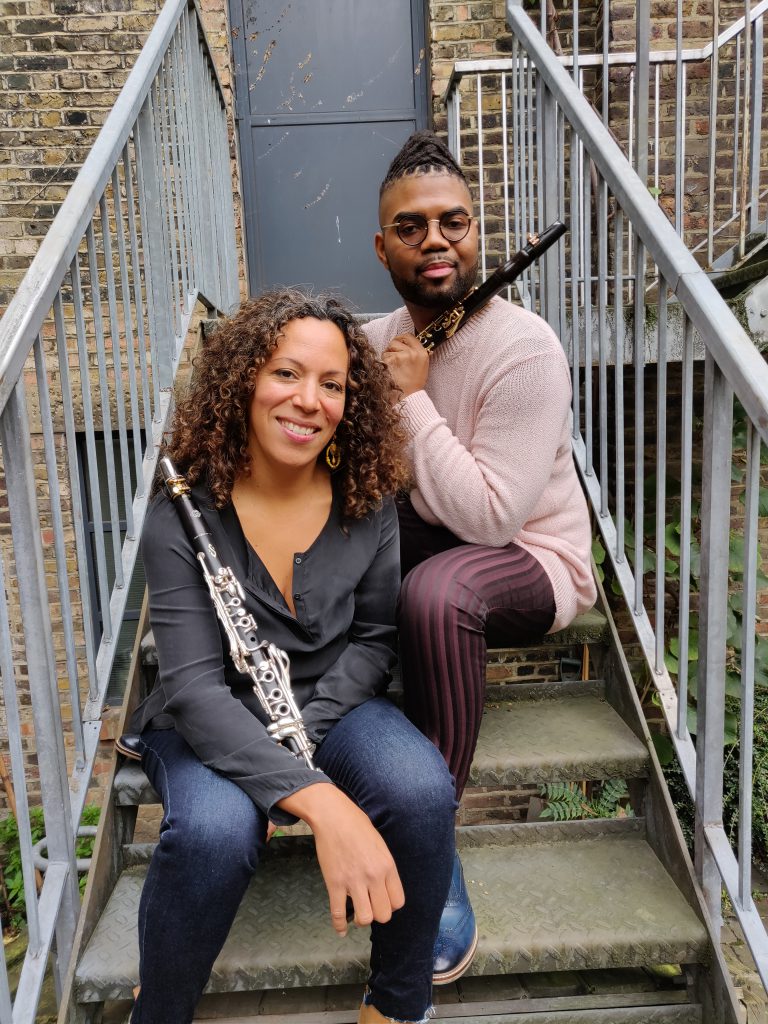
Photo by Matthew Higham The Warehouse (London, U.K.)
Mariam Adam and I are the clarinetists of Chineke!, Europe’s first professional orchestra whose members are primarily Black and minority ethnic musicians. Chineke! was founded by double bassist Chi-chi Nwanoku O.B.E. in 2015, and its motto is “championing change and celebrating diversity in classical music.” Chineke! has performed at the Brighton, Cheltenham and Salisbury festivals, Wigmore Hall, Royal Festival Hall and the BBC Proms, and toured the U.K., Germany, Belgium and Italy while serving as associate resident orchestra at London’s Southbank Center. Prior to the COVID-19 pandemic, Chineke! was scheduled to make its first North American tour performing in cities such as Los Angeles, San Francisco, Washington D.C., and Ottawa; and later make its Edinburgh Festival debut ending with its sixth recording, an album of chamber music by Black composers. Bringing all of our artistic strengths and experiences to the table, Mariam & I share an appreciation for Chineke! serving as a crucible replete with opportunities to meet other world-class musicians and develop further collaborations beyond its own creative borders.
We’re often greeted with questions related to the work of the ensemble and asked to speak about our roles in expanding the reach of classical music. As friends and colleagues we often discuss our thoughts and experiences in hopes of encouraging, enlightening and celebrating the many advancements being achieved.
Berginald Rash: Your career has been varied and multifaceted from being a founding member of Imani Winds to half of the AdZel Duo to principal clarinet of Chineke!. In the U.K. and Ireland we would call this a “portfolio career” which is so greatly benefited by creativity, tenacity, and ambition. How did you find or make your way?
Mariam Adam: I am fortunate to have made some pivotal decisions in my life that led to what is now my career path based in Europe. The first was attending the Aspen Music Festival over 20 years ago now where I met a few musical angels: Valerie Coleman, the founder of Imani Winds; Myrissa Lai, who invited me to Europe; Stephanie Zelnick, who is my now AdZel Duo partner; and pianist Irene Ziglina who encouraged me to move to New York City for grad school.
BR: I am heartened by your humility in acknowledging the guidance you received early on in your career and education that encouraged you to not only continue on your artistic path but dream and envision more. I think that’s a huge part of just “making it” in this career, being around others who encourage and inspire, guide, and mentor. I too feel very fortunate that when I first started playing clarinet I had a teacher, F. Edward Knakal in Virginia Beach, who encouraged me throughout my formative education. I don’t think we can overstate the importance of having someone in your corner to do that.
MA: Absolutely. I think the biggest barometer of my career has been being able to be open to new ideas musically, the desire to keep learning and being at the right place and the right time.
BR: I agree. Timing is everything, serendipitous and ephemeral. I certainly wouldn’t be living in Dublin and playing with you and my many other friends and colleagues in Chineke! if it weren’t for timing and the fortunate confluence of events, from my undergrad at Florida State University to my master’s at the University of Wisconsin–Milwaukee and second master’s at NYU–Madrid. It’s amazing and wonderful how those things come together and lead down a path hitherto unknown. Case in point: you’re in France!
MA: Exactly! Moving to France was a result of wanting a change that would help me grow as a clarinetist in the country that has birthed some of the leading wind instrumentalists. I felt I was in a place in 2016 to move on from what was a tremendous experience with Imani Winds, to pursue growth and learning (and eventually grow a family!) in France. A wonderful surprise was being a two-hour train ride away from the Chineke! Orchestra and ensemble which I affectionately call my new family. The collaboration with the members of Chineke! has been a rewarding experience that has encouraged me to be active in Europe in expanding the vision of musicians of various backgrounds.
BR: What an incredible journey! You’ve helped foment the roots of one of America’s most beloved chamber music groups, Imani Winds, and now you’re further extending and building on that strength, experience, and knowledge in the clarinet section of Chineke! No doubt you’ve got other more personal projects in the works.
MA: I’m definitely trying to bring my experiences to this side of the pond. A couple of projects now include a festival in the French vineyards as well as one in my hometown of Monterey, California. I love meeting new musicians and composers
with whom I collaborate to produce new works for chamber music, a genre that continues to be at the focal point of my musical passion.
BR: I love your creative energy and have been very inspired by you and the rest of our Chineke! family. I’m currently working on a few projects, one I’m especially excited about – my debut album, Dathanna: Hues & Shades, with Irish harpist Fiona Gryson. I’ve also had the pleasure of joining the London-based chamber group Decus Ensemble, founded by Uchenna Ngwe, that champions the works of African and Black British composers, and in the summers I have the pleasure of playing principal clarinet in szene12, a Dresden-based opera company conducted by Matthew Lynch that specializes in the reimagination and experimentation of classic opera.
How do you see the music world changing or evolving from when you set out to today, and where would you like to see it heading?
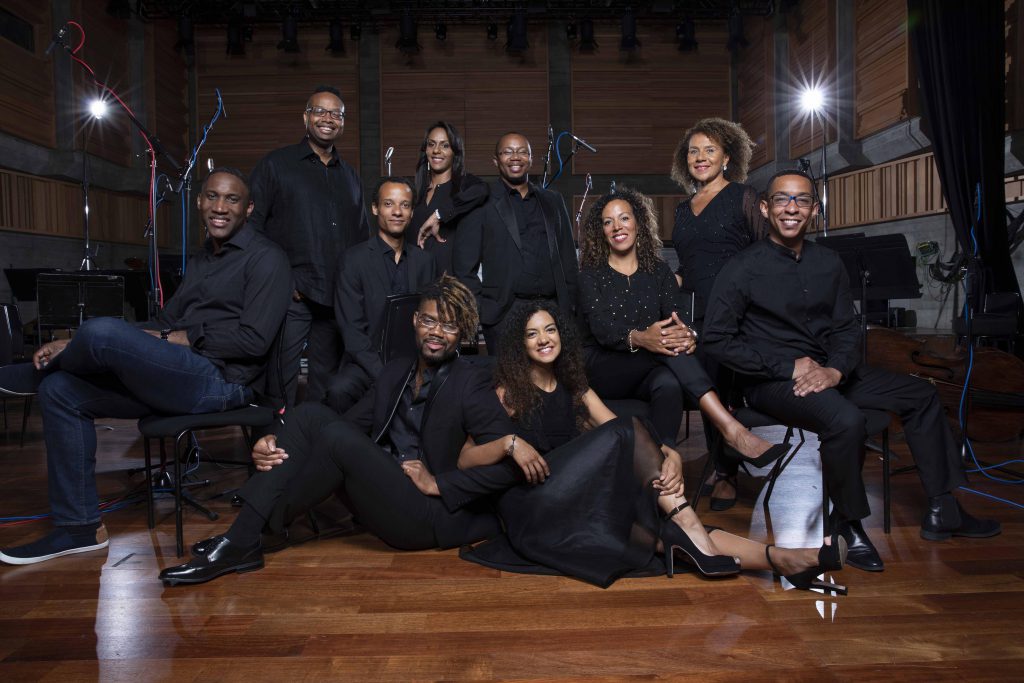
Photo by Eric Richmond
Southbank Centre’s Queen Elizabeth Hall (London, U.K.); (left to right) Burt Mason, Paul Philbert, Robert Olisa Nzekwu, Nermis Mieses, Samson Diamond,
Mariam Adam, Chi-chi Nwanoku OBE, Eric Lamb, Berginald Rash, Nicola Hicks
MA: I think I’m the most in awe of the resources students have today. Before, one traveled far and wide to gain an ear from a renowned teacher or to listen to a certain ensemble; now it’s at your fingertips 24/7 on the internet, much thanks to YouTube. I think this has had a significant benefit for people’s ability to be open to new concepts in contemporary music, interpretation, image and information. The age of information has been a boon and a burden in some ways, but I see many many students using this to their advantage to advance in their craft at a much faster pace than before. This does lead to a plethora of talent sometimes that has to be carefully guided even at the professional level.
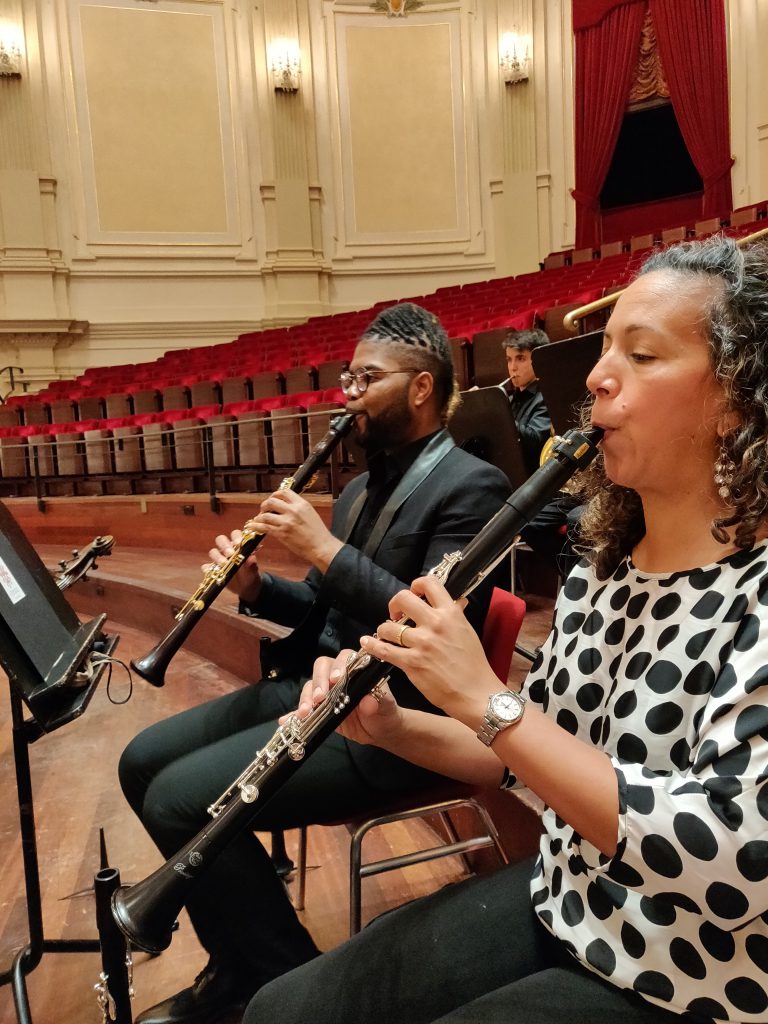
Photo by Matthew Higham
Het Concertgebouw (Amsterdam, Netherlands)
BR: I completely agree. We live in an age of information with access to great scholarship and pedagogy at the click of a button or the swipe of a finger. In a way the advent of technology has democratized education and access to it to an even greater extent, assuming one has access to the internet. I think another way the music world is evolving is the increased role the artist plays in arts development and production, the creation of work for themselves and the cultivation of work as both artist and curator. Artists today have to wear many more hats than are necessarily taught or provided; finding relevance and staying in touch with the zeitgeist is a constant challenge. Classical musicians today have to essentially market and hustle in the same vein as pop artists. I think that’s new and further links it to social media as well.
MA: Indeed, and I would like to see more people/women of color in positions of artistic leadership: directors of music and art schools, concert series, performing art venues, etc. I feel that sometimes even if you don’t go on to be a performer, you can find admin positions that might even help expand the minds of underserved populations with a voice and unique perspective that speaks to new audiences. I hope that classical music can soon have a connotation of accessible, understandable and relatable music for the whole population.
BR: And perhaps not just expanding the minds of audiences or would-be audiences but also those who develop and build audience bases. In much the same way the ICA has representatives around the world to connect people interested in the clarinet through pedagogy, scholarship, performance, etc., classical music would benefit from such ambassadors. There’s work to be done on both sides of the stage, and having people from diverse backgrounds leading the charge in positions of leadership is a very healthy path towards doing that. In providing access – a seat at the table – to diverse audiences, populations and artists, we’re committing ourselves to doing just that. We’re just now beginning to see, with the rising popularity and awareness of the Black Lives Matter movement in the arts sector, orchestras and chamber ensembles actively seeking feedback from diverse artists, musicians and audience bases, and using those relationships to further develop authentic representation across the board, on the podium, and in the ensemble.
Artistically, what is something you’re passionate about?
MA: I love the mixing of genres of music in a comprehensive way that respects authenticity while leaving room for tradition and interpretation. For me music – even contemporary experimental music – should have some sort of story, feeling, or dialogue with the listener. I have always liked the idea, especially in recitals, that the audience is on a journey with me through all the music; it’s important to make the live music experience relevant and that’s something I’m passionate about. That has led to my desire to want to have my own chamber music festival and to curate concert series that collaborate with everything from food, visual art and spoken word to puppetry and nontraditional settings.
BR: That sounds very exciting and reminds me of my work with the non-profit chamber music ensemble, Vivre Musicale, which focused on bridging the gap between the emerging artist and the professional through interdisciplinary collaboration. Helping highlight and guide emerging artists through the milieu of career development has been an artistic passion of mine. I love your idea of bringing all of these sensory experiences together to further enhance an electrifying concert experience. Concert curation is one of those arts skills I believe every musician needs for success in the 21st century.
Knowing the mission of Chineke! and being so instrumental is its growth as a principal player, how would you describe the purpose of Chineke!?
MA: The mission of Chineke! is quite parallel to the mission of Imani Winds. Over the years with Imani Winds we saw a lot of growth in the types of audiences who came to classical music concerts as well as the number of professional musicians of color. This is quite in step with “championing change and showing diversity in classical music.” We spent a lot of time helping concert venues cultivate these audiences, not just at the adult level but with young children all the way through university. This is the kind of ground work that is needed, and it has to have the support of the community and government alike. It’s many early mornings at schools, pre- and post-concert cocktails and meetings with administration and sponsors, and Q&A with young audiences that contribute to consistent change in our industry. Chineke! has had the added benefit of having the support of a nation that has shown it’s ready to recognize the changing face of classical music.
BR: I appreciate your acknowledgement of the grassroots work that has to be done at every level of artistic engagement. There are tangible rewards in that beyond an increase in numbers; there’s the expansion of ideas and the connection with others unlike ourselves. I also appreciate your recognizing that in order for such initiatives to be successful they require support from the community – both the one being served and the one providing a service. For me the biggest difference between Chineke! and other ensembles with whom I’ve played is the immediate feel of family and camaraderie I experienced. I can’t tell you how awestruck I was by the beauty and vitality of the group. For me it was magical.
MA: It is definitely a visually stunning ensemble! Chineke! strives to make classical music played by musicians of color known, but to also expand the audience to those who perhaps wouldn’t “normally” come to such concerts. I feel the high level of musicians and the variation of projects have made Chineke! a well-known entity that I’m quite proud to be a part of.
BR: I would also add that a huge part of its mission is to normalize and encourage the existence of ensembles, namely orchestras, that reflect their communities. There’s a huge push for that globally, to see ourselves reflected in the media we consume, and Chineke! is committed to seeing that come to fruition within classical music.
How would you say the unique mission of Chineke! is relevant globally to the wider music world and specifically
to clarinetists?
MA: Chineke! couldn’t have come into existence at a better time. There is a socio-conscious wave that is sweeping through Europe. I believe music is a portal to people’s sensibilities and need for entertainment and escape. As a clarinetist I have seen that it’s possible to make an impact on an audience with a simple thing like the well-known opening of Rhapsody in Blue – often people just want to recognize something so that they can feel comfortable in being exposed to new things.
BR: I couldn’t agree more. Clarinetists the world over can be inspired by the work being done by Chineke! and its expansion of visibility for all of us who love this art form. I think Chineke! stands as a testament to what can be done when we make room and offer others a seat at that table. It is similar to how Gershwin’s Rhapsody in Blue and Porgy and Bess propelled the notion of jazz music as concert music – not merely borrowing the compositional language of jazz and jazz idioms, but fully channeling the genre and presenting it as truly relevant in its own right.
Can we talk about our clarinet equipment? I’ll go first. I’ve recently joined the artist roster of the Devon & Burgani clarinet family. I play on their exquisite Fluency model A & B-flat grenadilla clarinets with gold keys; Vandoren B40 13 mouthpiece; Vandoren leather ligature with metal insert and Vandoren pink gold ligature and recently added the Ishimori Kodama II ligature and their pink gold ligature to my arsenal; for reeds I rotate through Vandoren Rue Lepic (black box) and D’Addario Evolution (yellow box) 3 and 3.5 reeds.
MA: Since living in France, I am a Selmer Paris Artist playing on Selmer Privilege clarinets, though I previously played Luis Rossi rosewood clarinets (still in my heart and soul, those babies!); Vandoren B40 13 mouthpiece, and I’ve previously used a Ramon Wodkowski mouthpiece and Clark Fobes mouthpieces and barrel. I have been a fan of wrapping with string instead of using a ligature, but often in the interest of time I use a Rovner Versa. For reeds, I move between Vandoren V21 3.5+ and V12, and occasionally Pilgerstorfer.
* * * * *
Learn more about Chineke! at www.chineke.org.
About the Writer
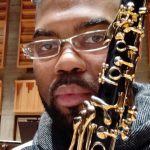
Berginald Rash is a freelance clarinetist and educator based in Dublin, Ireland, where he’s collaborated with RTÉ National Symphony Orchestra and RTÉ ConTempo Quartet and served as an 1848 Scholar and teaching fellow at the Royal Irish Academy of Music where he completed a recital artist diploma. He has served on the faculty of PRIZM Music Camp and International Chamber Music Festival and has given a master class with Vivre Musicale at Truman State University. Berginald has collaborated with members of such orchestras as the Atlanta Symphony, City of Birmingham Symphony and Frankfurt hr-Sinfonieorchester. He is a Devon & Burgani artist and has played with Chineke! since their inaugural concert as both principal and second/bass clarinet, and with that group made his debut at the BBC Proms, Snape Maltings Proms and Ghent Festival. Learn more at www.berginaldrash.com.
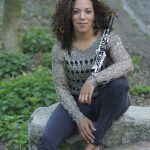 Mariam Adam is an internationally known chamber musician, soloist, music advocate and educator originally from Monterey, California. A founding member of the Grammy-nominated Imani Winds, she has maintained an active touring career with performances at Carnegie Hall, Kennedy Center, Beijing Arts Center and the Hollywood Bowl among others. Since moving to France in 2016 she has performed with Eric le Sage, Francois Salque and Xavier Philippe; has been a featured artist at the Folle Journee, Colmar Festival and Radio France Festival; toured with actor Gaspard Proust, the Jerusalem Trio and Le Cercle; and soloed with the Singapore Symphony, Appassionata Ensemble and Orchestre de Pau. Mariam is a Selmer Paris artist and has been performing with Chineke! Orchestra and Chamber Ensemble as principal clarinet since 2016. Learn more at www.mariamadam.com.
Mariam Adam is an internationally known chamber musician, soloist, music advocate and educator originally from Monterey, California. A founding member of the Grammy-nominated Imani Winds, she has maintained an active touring career with performances at Carnegie Hall, Kennedy Center, Beijing Arts Center and the Hollywood Bowl among others. Since moving to France in 2016 she has performed with Eric le Sage, Francois Salque and Xavier Philippe; has been a featured artist at the Folle Journee, Colmar Festival and Radio France Festival; toured with actor Gaspard Proust, the Jerusalem Trio and Le Cercle; and soloed with the Singapore Symphony, Appassionata Ensemble and Orchestre de Pau. Mariam is a Selmer Paris artist and has been performing with Chineke! Orchestra and Chamber Ensemble as principal clarinet since 2016. Learn more at www.mariamadam.com.
Comments are closed.